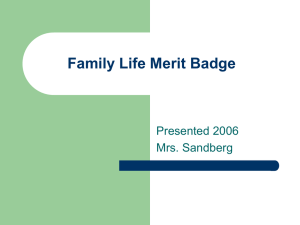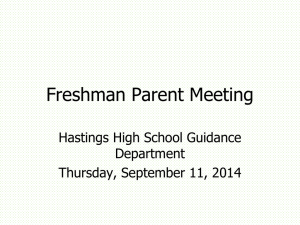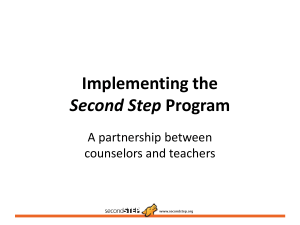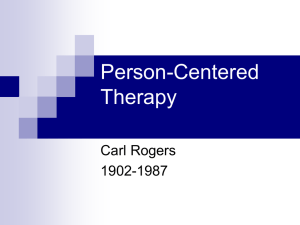Please add to PPT - Rhode Island School Counselor Association
advertisement
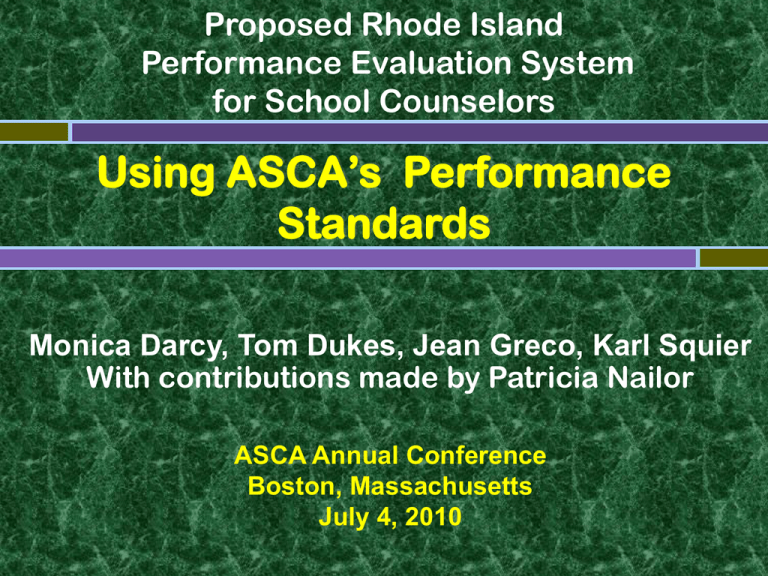
Proposed Rhode Island Performance Evaluation System for School Counselors Using ASCA’s Performance Standards Monica Darcy, Tom Dukes, Jean Greco, Karl Squier With contributions made by Patricia Nailor ASCA Annual Conference Boston, Massachusetts July 4, 2010 Welcome Session goal: Describe process we have followed in developing a draft for school counselor performance evaluation in Rhode Island Session Outline Background: important influences on the process Thinking Steps: Competencies and Performance Standards Validation process of new standards Contextual information in RI Draft of school counselor evaluation process How Did We Get Here? Influences on counselor education program Core Questions What is it counselors do? How do we know what our candidates can do? What resources do we have to determine this? – ASCA National Model School Counselor Performance Standards School Counselor Competencies Where Did We Turn for Candidate Evaluation? 1st Effort = School Counselor Performance Standards Problem : Includes professional and program standards Many areas not addressed in evaluation tools 2nd effort= Higher education pre-service standards Problem: Graduate candidates should be evaluated as if they were counselors in the field State approval feedback was critical Then …? 3rd effort = School Counselor Competencies Rating forms developed for faculty and field supervisors: Section III – Delivery 4th effort= ASCA Performance Standards Standards cannot be easily evaluated Shift in Focus Input from varied constituents Our goal: design a simple and elegant system for evaluating what school counselors do So….. We Dug Deeper into Existing Documents Competencies, for example, include – Practitioner – Supervisor – Programs – Ethical standards – Position statements Conclusion: about 50/50 split of competencies for counselor practitioners and counseling program or administrator/supervisor functions And… Professional standards are linked to Model, but the Model defines a quality program Indicators are not action oriented Not results based or measurable Impact of a counselor is not measured in any of these So… Look again at Performance Standards The Golden Standard - #13 The professional school counselor is a student advocate, leader, collaborator and a systems change agent Reorganized Standards 1-12 into 13.1 to 13.7 First Outline – ASCA Performance Standards Organized in Standard 13 1, 2, 3, 4, 10, 12 13.1 2,10 13.2 6 13.3 8,9 13.4 7 13.5 4.2, 5 13.6 8,11,12 13.7 Proposed Standards and Competencies For Rhode Island Professional School Counselor Evaluation System Guiding Principles Evaluation criteria must focus on individual competency rather than program effectiveness Counselors have a rigorous evaluation based on the standards of excellence for their profession Guiding Principles: Measure Impact of School Counselors on: Student achievement in three developmental domains School reform initiatives School leadership and governance Helping district demonstrate accountability defined in state and national legislation and regulatory language Proposed Standards 1. Promotes the academic, career, and personal/ social development of every student 2. Advocates for equitable opportunities for every student 3. Assumes a leadership role within the school community 4. Collaborates to support the success of all students 5. Utilizes data to promote student success and systemic change Standard 1 Competencies A. The professional school counselor contributes to planning the school counseling program. B. The professional school counselor contributes to implementation of the school counseling program. C. The professional school counselor contributes to evaluating the school counseling program. Standard 2 Competencies A. The professional school counselor monitors student progress through examining student achievement data and achievement related data B. The professional school counselor disaggregates data to determine which groups of students are under-served, under-performing and underrepresented populations C. The professional counselor initiates activities and interventions designed to close the achievement gap D. The professional school counselor identifies and addresses barriers that hinder school success E. The professional school counselor promotes a school climate in which access and support for rigorous preparation for every student is expected Standard 3 Competencies A. The professional school counselor contributes his/her developmental and clinical expertise to system support and operations B. The professional school counselor participates in school wide initiatives. C. The professional school counselor integrates expertise with other professionals to influence educational change. Standard 4 Competencies A. he professional school counselor demonstrates effective interpersonal relationships with students, staff, parents or guardians, and community B. The professional school counselor consults effectively with families, parents or guardians, teachers, administrators, and other relevant individuals to support academic, career, and personal/social development. C. The professional school counselor interfaces with community, education and human service organizations to support student transitions and academic success D. The professional school counselor incorporates feedback from other stakeholders, supporting organizations, and individuals to improve program design and delivery Standard 5 Competencies A. The professional school counselor gathers, analyzes and reports meaningful process, perception and results data. B. The professional school counselor utilizes data to inform practice C. The professional school counselor uses data for ongoing refinement of the school counseling program D. The professional school counselor utilizes data to promote systemic change and advance educational reform Alignment with Legislation and Regulations Need for Alignment School counselor evaluation must be aligned with state and federal legislation and regulations Counselor evaluation must be aligned with national requirements (e.g., NCLB) Counselor evaluation must also be aligned with state regulations and Department of Education initiatives Counselors in Rhode Island Are a Driving Force in Policy Development Self-advocacy Enlisting the help of those who support comprehensive school counseling programs in public education Participating in dialog about policy language Providing potential policy language to policy makers Attending and speaking at key meetings (e.g., RI Board of Regents) RI Basic Education Program—1 Each LEA shall ensure that schools will implement strategies for creating personalized environments to optimize learning. Each LEA shall establish PK-12 protocols for communication and record sharing that will facilitate successful transition from grade to grade, school to school, district to district, and high school to post-secondary opportunities RI Basic Education Program—2 Establish structures by which every student is assigned a responsible adult, in addition to a school counselor (where applicable), who is knowledgeable about that student’s academic, career, and social and personal goals Establish protocols for the development, implementation and student-based monitoring of Individual Learning Plans RI Basic Education Program—3 Each LEA shall establish and maintain a Comprehensive School Counseling Guidance (CSC) Program, including guidance and counseling services, available to all students in grades K-12. Each LEA shall ensure that the CSC Guidance program shall be developed and delivered in accordance with the Rhode Island Framework for Comprehensive K-12 School Counseling Programs RI Basic Education Program—4 Support each student in meeting the American School Counselor Association (ASCA) standards in the academic, career, and personal and social domains; Be a coordinated effort among the professional counseling staff and the rest of the educational community; and Include services to be provided to students at each developmental stage and specify how the services will be provided to all students Rhode Island Diploma System (Middle and High School Regulations) Personalization – Every middle level and high school student is assigned a responsible adult, in addition to a school counselor. This adult is knowledgeable about that student’s social/emotional, academic, and career goals and supports his or her progress towards graduation. Each student, beginning no later than entry into sixth grade, shall have an individual learning plan (ILP). The Commissioner’s Review RI Educational Accountability System The Commissioner’s Review, Rhode Island’s school accountability system, requires districts to provide compelling evidence that student learning experiences are more personalized and that a high quality comprehensive school counseling program is being successfully implemented. RIDE’s Reform Agenda Effective teachers in every classroom Effective leaders in every school Teachers and leaders work within a system based on student need Four Areas of Reform Improve Student Achievement Close the Achievement Gap Increase High School Graduation Rates Raise College Enrollment RI Educator Evaluation System Standards Requirements Base evaluation primarily on evidence of impact on student growth and academic achievement Differentiate four levels of effectiveness Conduct annual evaluation of all educators Ensure transparent, fair evaluation process Involve teacher and principal involvement in development process Educator Evaluations Primary Factor (51%): Data on student growth and achievement Three Additional Required Factors: Quality of instruction Demonstration of professional responsibilities Content knowledge Utilization of Evaluation Results Provide individualized feedback to all educators Support continuous professional development Create incentives for highly effective educators Provide information for renewal and tenure decisions Improve performance of ineffective educators Pay Attention and Get Involved High quality educators is a national priority A clearly-defined and rigorous counselor evaluation system is one way to demonstrate that we are highly-qualified We must pay attention to what is going n and get involved with the change process Failure to do so is detrimental to individual counselor positions and the future of our profession Proposed School Counselor Evaluation Process Proactive Process Begin with a vision of excellence for K-12 school counselors Develop a rigorous and accurate evaluation system that clearly articulates the school counselor’s unique contribution to student success Define our accountability system versus having others define it for us Evaluation Process Pre Conference Performance Portfolio Observation Post Conference Pre-Conference: Results Agreement Program Results Parent Results Students’ Results Staff Results Self-development Results Assigned Tasks Pre-Conference: Results Agreement Results to be delivered by the counselor for students, parents and staff are written Competencies that each student will attain are identified Plans for student results are recognized as priorities of the school counseling program and part of administration’s expectations Set of tasks assigned by administration are written Performance Portfolio Artifacts Evidence of the 5 standards and 15 competencies Evidence of impact upon student growth and academic achievement Evidence of quality instruction Evidence of professional responsibilities Evidence of content knowledge Observation School Guidance Curriculum Individual Student Planning Responsive Services Systems Support Post Conference Reflection and Self-Assessment Evidence of Expected Results Dialogue Evaluation Assessment Plans for improvement ASCA National Model Barriers to Implementation Too many noncounseling duties Misunderstanding of counselor role Time constraints Lack of knowledge Documentation tools Tools to Overcome Barriers Professional Development for Evaluators Professional Development for Counselors Resources Professional Development Evaluators can be educated regarding professional standards and competencies Proposed revisions simplify and streamline this while still capturing the heart of the profession Rubrics must be developed Professional Development It is essential that rigorous and accurate evaluation be tied to timely and relevant professional development for counselors This approach is based on an understanding of professional school counselors as educational leaders Professional Development The proposed professional standards revision highlights the following roles: Leadership Advocacy Collaboration Consultation Use of Data Professional Development Confidence in executing these roles should be grounded in expertise: Developmental Understanding Clinical skill Systems perspective Resources RISCA Toolkits www.rischoolcounselor.org EZAnalyze www.exanalyze.com CSCOR www.cscor.org Resources ASCA National Model ASCA National Model Workbook Making Data Work ASCA Ethical Standards ASCA Position Papers www.schoolcounselor.org Final Thoughts School counselors need their own evaluation system that assesses their unique contribution to student success and school reform The evaluation system should be simple, elegant and meaningful The future of K-12 school counseling depends on our ability to demonstrate our worth to others Contact Information Monica Darcy mdarcy@ric.edu Tom Dukes tdukes@ric.edu Jean Greco jeangreco@yahoo.com Karl Squier karlsquier@cox.net RISCA rischoolcounselor.org
